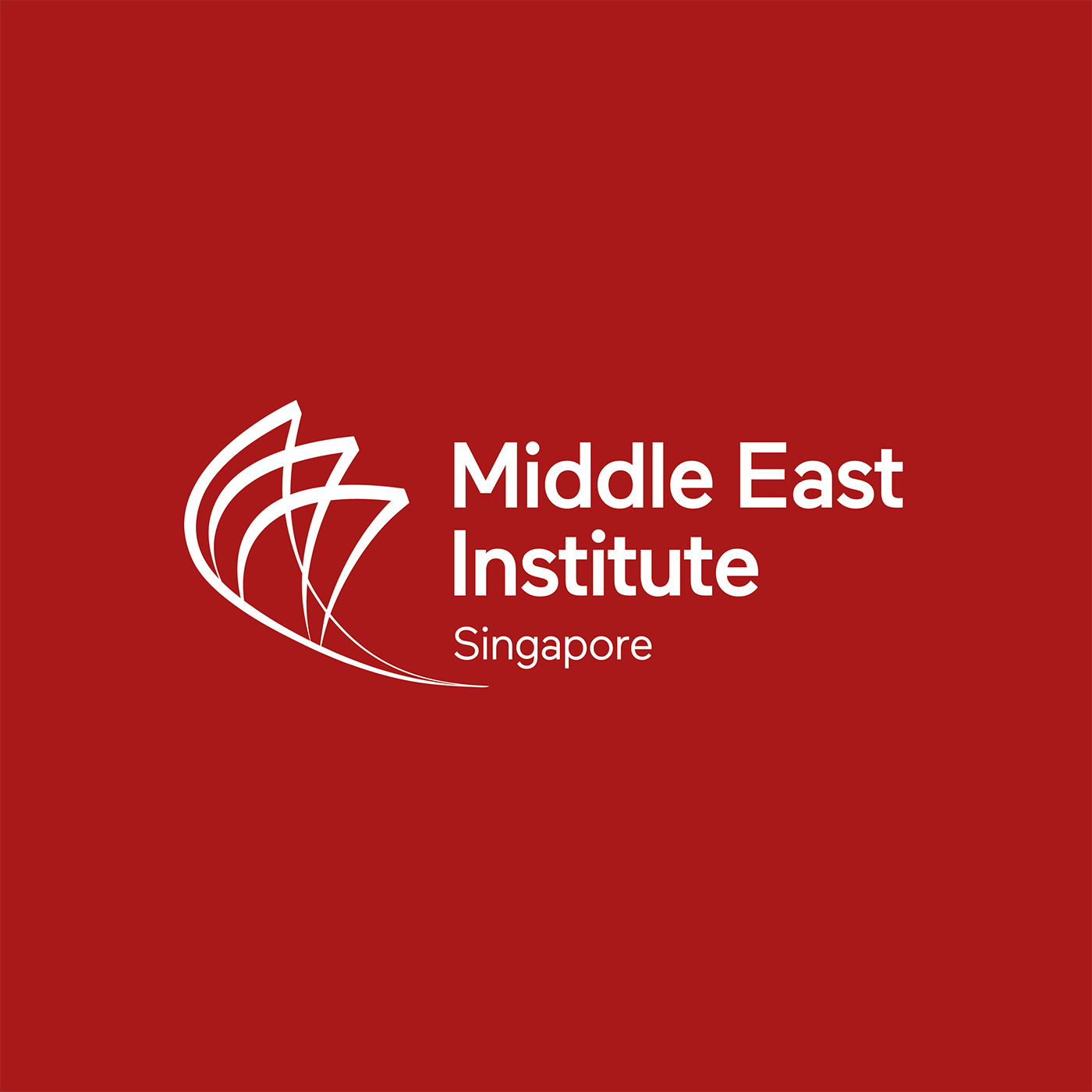Episodes
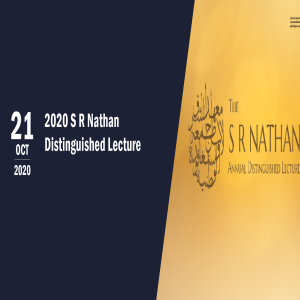
Wednesday Oct 21, 2020
2020 S R Nathan Distinguished Lecture
Wednesday Oct 21, 2020
Wednesday Oct 21, 2020
In an increasingly multipolar world, small states are facing many dilemmas. Can small states prosper while they are continuously facing threats to their existence? How can small states navigate their way through questions of development, globalisation, security and multilateralism while preserving and defending their autonomy and identity?
The Qatari Assistant Foreign Minister will discuss how her country is thriving despite a land, sea and air blockade that its neighbours illegally imposed three years ago, and how small countries can navigate their geopolitical positions in this contested era. Qatar is notably present in the international arena, being the world-leading exporter of liquefied natural gas (LNG), the mediator of the peace agreement between the US and Taliban, and the 2022 FIFA World Cup host. Qatar achieved this despite active efforts from its neighbours to sideline it.
Drawing from the many similarities and shared interests between Qatar and Singapore, Her Excellency Lolwah Alkhater’s lecture will examine such questions: what are the most effective tools for small states to navigate their way and define their position? How can small states learn from history and create a prosperous future? Finally, what are the mechanisms and areas for small states to collaborate?
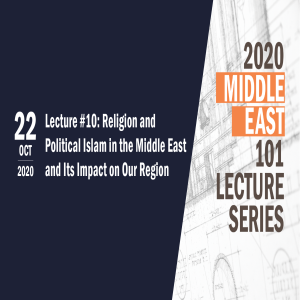
Friday Oct 23, 2020
Friday Oct 23, 2020
Lecture #10: Religion and Political Islam in the Middle East and Its Impact on Our Region
by Norshahril bin Saat [Thursday, 22 October 2020]
9/11 has refocussed analysis of Islam in Southeast Asia towards the security lens. Concerns about terrorism and radicalism dominate academic and journalistic writings, creating many academic positions in universities and think-tanks, and promoting Muslim theologians as the spokespersons for “moderate” Islam. Examination of other equally pressing concerns which can also impede progress and development of Muslims, such as non-violent extremism and quality religious education, are neglected. Lately, contextualization of Islam has become an area of interest. Malays are perceived to import Middle Eastern cultures, practices, and theology at the expense of local ones. Policy makers and academics refer to this process as “Arabization” of Southeast Asian Islam. Some consider this “Talibanization” referring to borrowing of radical ideas from the Talibans in war-torn Afghanistan.
This lecture examines critically dominant images of Southeast Asian Islam focussing on three countries, Singapore, Indonesia and Malaysia. In highlight interaction between the region and Middle East. Applying the socio-historical approach, the lecture makes three arguments: (1) while Islam originated from Middle East, the type of Islam brought to Southeast Asia was predominantly the Sufi type; (2) the heterogeneity of Islam in the Middle East also shapes Southeast Asia differently, depending on which era is discussed, and the country of focus; and (3) Islam and politics take many forms in Southeast Asia, and they adopt and adapt to global and local dynamics, such as capitalism, feudalism, socialism, and revivalism. The impact of Middle East movements Sufism, Shiism, Muslim Brotherhood, Salafi-Wahhabism, Hizmet and reformism will also be discussed.
![[Prominent Speaker Series] SCO: An Important Factor in Ensuring Stability and Sustainable Development in Eurasia](https://pbcdn1.podbean.com/imglogo/ep-logo/pbblog4563756/Start_tileas9o4_300x300.jpg)
Wednesday Oct 28, 2020
Wednesday Oct 28, 2020
The Shanghai Cooperation Organisation (SCO) is a permanent intergovernmental international organisation; its predecessor was the Shanghai Five mechanism. The SCO’s creation was announced on 15 June 2001 in Shanghai, China, by the Republic of Kazakhstan, the People’s Republic of China, the Kyrgyz Republic, the Russian Federation, the Republic of Tajikistan and the Republic of Uzbekistan.
Currently, the organisation comprises eight member states, namely the Republic of India, the Republic of Kazakhstan, the People’s Republic of China, the Kyrgyz Republic, the Islamic Republic of Pakistan, the Russian Federation, the Republic of Tajikistan and the Republic of Uzbekistan. Four other states have observer status: they are the Islamic Republic of Afghanistan, the Republic of Belarus, the Islamic Republic of Iran and the Republic of Mongolia.
The organisation has two permanent bodies: the SCO Secretariat, based in Beijing, and the Executive Committee of the Regional Anti-Terrorist Structure, based in Tashkent, and has six dialogue partners, namely the Republic of Azerbaijan, the Republic of Armenia, the Kingdom of Cambodia, the Federal Democratic Republic of Nepal, the Republic of Turkey, and the Democratic Socialist Republic of Sri Lanka.
In this lecture under our Prominent Speaker Series, HE Vladimir Imamovich Norov, the secretary-general of the Shanghai Cooperation Organisation, will talk about the crucial role that the SCO plays in ensuring stability and sustainable development in the region.
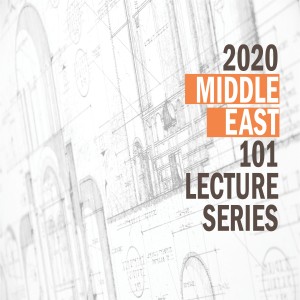
Friday Oct 30, 2020
ME 101 Closing Session: The Centrality of Central Asia
Friday Oct 30, 2020
Friday Oct 30, 2020
In the concluding lecture for our ME 101 series, Dr Alessandro Arduino examines Central Asia, a region of particular importance and increasingly a destination for Chinese investment. It is a critical bridging point, not only between China, Russia and Europe but also between South Asia and the Middle East.
![[MEI Salon Series] Stories of Hope from Iraq](https://pbcdn1.podbean.com/imglogo/ep-logo/pbblog4563756/Salon_Series_Title_30_Oct_small6trmj_300x300.png)
Tuesday Nov 03, 2020
[MEI Salon Series] Stories of Hope from Iraq
Tuesday Nov 03, 2020
Tuesday Nov 03, 2020
Speaker: Charlene Winfred, Photographer, Singapore
What comes to mind when you think of Iraq? Deserts? Bombs? Soldiers? Destruction? Over the last 50 years, Iraq has seen multiple wars ― the Iran–Iraq war, the first Gulf war, the US invasion, the war with the Islamic State ― and the devastation that comes with prolonged conflict. Millions of lives were lost, and millions were displaced. What does ordinary life look like when you’re a refugee?
Ms Winfred spent a year in Kurdistan, the autonomous Kurdish region in northern Iraq, working for a small NGO helping refugees to rebuild their lives in the long shadow of war, and listening to the stories of many refugees. She was struck not only by how unimaginable these stories were to someone like her ― from safe, stable Singapore ― but unexpectedly, also by how much they resonated. These are stories most of us can identify with, no matter who we are, and where or how we live.
What do people who have lived in conflict long for, just like those who live in peace?
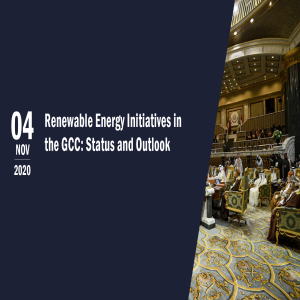
Thursday Nov 05, 2020
Renewable Energy Initiatives in the GCC: Status and Outlook
Thursday Nov 05, 2020
Thursday Nov 05, 2020
The Middle East Institute organises webinars on relevant and current topics related to the Middle East region and their ramifications for Asia and the world. In this webinar, we will be exploring the Gulf Cooperation Council (GCC) and its initiatives in renewable energy.
Across the Gulf Arab states, the main drivers of this new focus on renewables have not been climate change goals (eg the Paris Agreement) as in the OECD countries. Rather it has been the need to keep up with growing domestic oil and gas demands for electric power grids while also increasing exports, and to free up fuel needed for downstream economic diversification projects such as oil-based petrochemical projects. The countries in the GCC are among the few countries in the world still using oil for power generation during peak demand in the summer months, which is a major loss in economic value as oil is far more valuable as a transport fuel and as feedstock for petrochemicals.
The purpose of the talk would be to assess the progress to date, the extent to which solar power can alleviate local oil and gas demand in the power generating sector (and hence release more oil and gas for exports in the future), the potential for this sector to promote new economic activity in the GCC countries’ diversification efforts and job creation, the potential for Asia-based companies to invest in this sector, among other questions. The UAE nuclear power plant coming on-stream, as part of non-oil and gas development, would also be part of the discussion.
![[Boots Off the Ground: Security in Transition in the Middle East and Beyond] Episode 8: Regulation and Accountability of Private Military in the Eyes of International Law](https://pbcdn1.podbean.com/imglogo/ep-logo/pbblog4563756/BOTG_LOGO_aat_Dec_20207k737_300x300.jpg)
Wednesday Nov 18, 2020
Wednesday Nov 18, 2020
In this episode, we speak to Professor Simon Chesterman about the possibilities and limitations of regulating private military and security companies through international law. We will also explore whether there are better alternative solutions that are local and market-based.
![[Book Launch] Vision or Mirage: Saudi Arabia at the Crossroads](https://pbcdn1.podbean.com/imglogo/ep-logo/pbblog4563756/Book_Launch_Title_Template_Compressedb3llh_300x300.png)
Friday Nov 27, 2020
[Book Launch] Vision or Mirage: Saudi Arabia at the Crossroads
Friday Nov 27, 2020
Friday Nov 27, 2020
Speaker: David Rundell (Former Chief of Mission, American Embassy in Riyadh)
Saudi Arabia remains to many an enigma despite significant social and economic reforms enacted since King Salman ascended to the throne in 2015. The crackdown on activists as well as the killing of journalist Jamal Khashoggi, the subjugation of powerful members of the ruling family and the business community, and the war in Yemen have tarnished its relationships in the West.
Providing a unique and granular analysis of the inner workings of the kingdom, Mr David Rundell, who served a total of 15 years as a US foreign service officer in Saudi Arabia, illustrates King Salman’s long-standing focus on combatting corruption that is at the core of Saudi reforms in his recently published book, Vision or Mirage: Saudi Arabia at the Crossroads. The former diplomat also delves into the governing of King Salman’s governing of the Saudi capital, Riyadh, for nearly five decades before his ascension to the throne.
Anti-corruption has played a dramatic role since Salman became king in solidifying and concentrating power in the kingdom and breaking with a past of slow and gradual change. Instead, King Salman introduced rapid reforms with little consultation. To do so, he picked his son, Mohammed bin Salman, as crown prince because he saw in him a bulldozer with the needed ambition, drive, and ruthlessness to undermine the traditional pillars of support of the Saudi system like elite cohesion and the maintenance of rival armed forces.
In doing so, Mr Rundell argues that King Salman may have made Saudi Arabia less stable by turning it into a country in which absolute political and military power have been concentrated in the hands of one man, ruling over a young population that aspires for greater transparency and accountability.
Image caption: Saudi Arabia’s Crown Prince Mohammed bin Salman attending the G20 summit in Osaka, Japan. Photo: Palácio do Planalto / Flickr
![[Boots Off the Ground: Security in Transition in the Middle East and Beyond] Episode 9: From Private Security to Cybersecurity: When Virtual Threats Become Real Risks](https://pbcdn1.podbean.com/imglogo/ep-logo/pbblog4563756/BOTG_LOGO9170s_300x300.jpg)
Wednesday Dec 09, 2020
Wednesday Dec 09, 2020
In this episode, the hosts talk to Gene Yu, CEO and co-founder of cybersecurity incident response firm Blackpanda Group. Yu argues that cybersecurity is just physical security on a different terrain, that it is a security, not an information technology problem, and shares anecdotes from his time on the "blue team" of cybersecurity first responders, including in Singapore.
![[Boots Off the Ground: Security in Transition in the Middle East and Beyond] Episode 10: Decoding Russian Private Military Security Companies](https://pbcdn1.podbean.com/imglogo/ep-logo/pbblog4563756/BOTG_LOGO9170s_300x300.jpg)
Wednesday Jan 06, 2021
Wednesday Jan 06, 2021
In this episode, Ms Candace Rondeaux, an expert on international security apparatuses, breaks down the purpose, demographic and long-term implications of Russian private military companies in the international and domestic arena.

